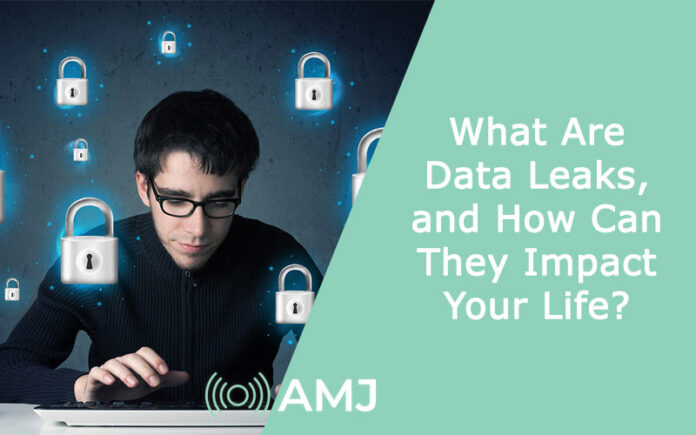There’s rightfully much talk about cybercrime and its harmful impact on people and organizations alike. However, certain behaviors and vulnerabilities can also expose valuable data and create numerous problems. What are these data leaks, how do they happen, and what can you do to avoid them? Find out below.
Contents
Data Leaks Explained
A data leak is the accidental exposure of sensitive information. It’s similar to a data breach in that the damage criminals who get a hold of it can cause may be devastating. A data breach is the result of a targeted cyberattack. Leaks happen due to negligence, poor software & systems maintenance, and social engineering.
The information that becomes accessible via a data leak often leads to more far-reaching cyberattacks. For example, an employee’s exposed company email address can become the starting point for more sinister information gathering, extortion, or espionage.
How Do Data Leaks Happen?
Pinpointing a data leak can be tricky due to the diversity of potential causes. Human error is a strong factor. On the one hand, people may lose devices containing sensitive data. On the other, many approach data security carelessly. The number of people who use & reuse default or easy-to-guess passwords is alarming. Let’s also not forget those who write them down and leave them out in the open.
While a major cause, human error isn’t completely to blame. Security vulnerabilities in operating systems, programs, or online services can remain hidden for months, even years. Cybercriminals exploit these zero-day vulnerabilities to gather information without having to directly target a network.
What Information Can a Data Leak Expose?
Depending on the source, a data leak can contain diverse information on individuals or companies. Personally Identifiable Information (PPI), is among the most common. It can include people’s full names, SSNs, financial information, and medical records.
Leaked company data is even broader. It can contain internal conversations, memos, and metrics that give a lot of insight into a company’s day-to-day operation. The trade secrets companies keep are the Holy Grail for crooks engaging in corporate espionage. These may include patents, source code, or marketing strategies for upcoming products.
What Are the Consequences?
Data leaks don’t need to snowball into breaches to have major consequences. On a personal level, identity theft is the most serious one. With your info in hand, crooks can set up new bank accounts or drain existing ones. They may also sign up for loans or make purchases that can lead to financial ruin.
Doxxing is another serious threat. This comprehensive privacy breach exposes PII to the world at large, leaving the target open to harassment, threats, end even physical danger.
Information obtained from data leaks can help refine social engineering attacks. Phishing is the most common and fastest-growing example. A phishing attack is usually an email that looks like it came from a reputable government organization or a higher-up in one’s company.
The emails encourage recipients to click on links to resolve some made-up issues. These links take them to fake sites masquerading as official ones. Criminals collect and exploit any information you enter into forms on such sites.
Criminals may demand a ransom to hand over sensitive company information obtained through a leak. They can sell the information to the competition or publish it outright in an attempt to damage the company’s reputation.
Data leaks potentially wreak havoc on a large scale. They may shake people’s trust in affected government agencies or expose how interested parties try to influence public opinion.
How to Protect Yourself from Leaks?
You can take several effective measures to safeguard your data. While diverse, they boil down to mindfully handling vulnerable data and the devices you access it from.
Ensuring your operating system and commonly used programs are current and updated automatically is the first step. You’ll also want to go over your passwords and replace any duplicate or easy-to-guess ones with stronger alternatives. Two-factor authentication will make them even more secure.
You should consider moving your most important data from legacy storage onto the cloud. That way, there are no copies to steal from your disks or USB drives. Cloud storage comes with encryption and access monitoring. You can give access to data stored in the cloud selectively and have insight into who accessed what and when.
Give your data out sparingly, and only to websites or individuals you trust. Check whether your email addresses have ever been part of a breach and stop using them. Make your social media accounts private and post in a way that doesn’t reveal any info you wouldn’t want others to know.












![Index of Money Heist [Season 1, 2, 3 & 4 – All Episodes, Cast and Plot] Index of Money Heist](https://www.asiamediajournal.com/wp-content/uploads/2021/05/Index-of-Money-Heist-3-100x70.jpg)